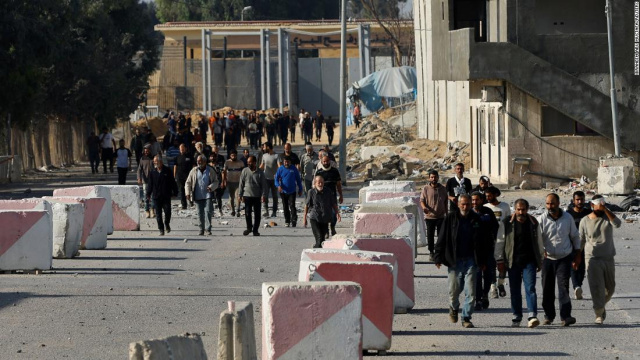Hopes for a swift implementation of a four-day ceasefire between Israel and Hamas have been dashed as the planned exchange of hostages and prisoners encounters unexpected delays.
Yesterday, amidst diplomatic efforts led by Qatar, an agreement was reached for the release of 50 Israeli hostages, including women and children, by the Palestinian group Hamas.
In return, Israel committed to releasing 150 Palestinian prisoners as a confidence-building measure.
However, a senior Israeli official has indicated that the planned prisoner exchange, initially scheduled for today, may face a postponement until tomorrow at the earliest.
This development raises concerns about the timely initiation of the agreed four-day ceasefire, previously set to commence at 10:00 a.m. today.
The complexity of the situation underscores the delicate nature of negotiations in the region, where tensions have been high, and the international community has been closely watching for signs of progress toward a sustainable peace.
While the exact reasons for the delay remain unclear, it is apparent that the implementation of such agreements involves intricate logistical and political considerations on both sides.
The postponement may stem from procedural challenges, last-minute hurdles, or internal discussions within the respective parties.
The proposed exchange, aimed at building trust and fostering an atmosphere conducive to the ceasefire, is a crucial component of the broader diplomatic efforts to de-escalate the longstanding conflict between Israel and Hamas.
The Qatari mediation has played a pivotal role in bringing the parties to the negotiating table, emphasizing the importance of regional actors in facilitating dialogue and conflict resolution.
As the international community waits anxiously for developments, there is growing concern about the potential consequences of any prolonged delays.
The fragile nature of the ceasefire agreement and the underlying tensions in the region necessitate a swift and successful implementation of the proposed measures.
Observers are cautiously optimistic that the setback in the planned exchange is a temporary hurdle, and both parties will work diligently to overcome any challenges, prioritizing the larger goal of achieving a sustainable and lasting peace.
The coming hours and days will be critical in determining the trajectory of the ceasefire and the broader implications for regional stability.
The international community continues to monitor the situation closely, underscoring the importance of a collaborative and coordinated approach to resolving one of the most enduring conflicts in the Middle East.
This article was created using automation technology and was thoroughly edited and fact-checked by one of our editorial staff members

